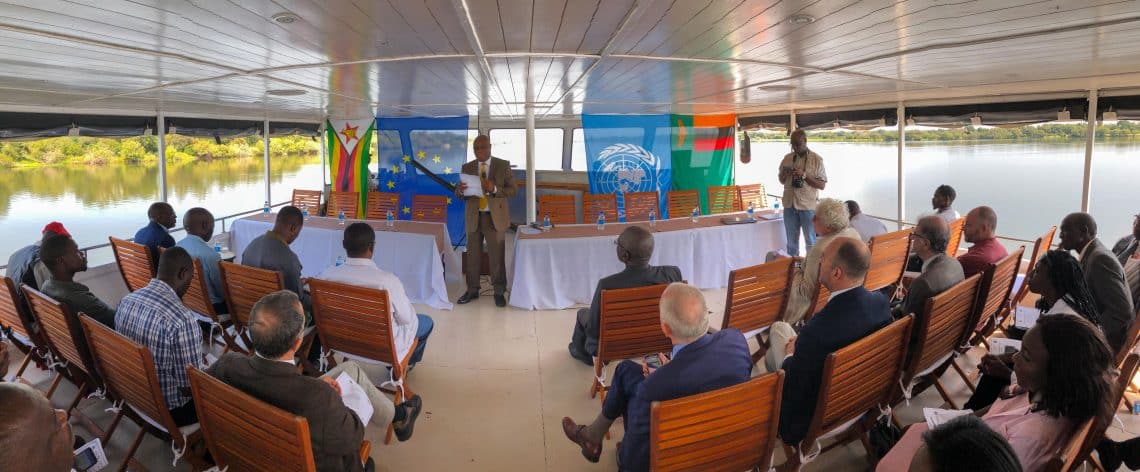The Sustainable Wildlife Management (SWM) Programme is funded to the tune of €45 Million by the European Union through the 11th European Development Fund (EDF), and co-funded by the French Facility for Global Environment (FFEM). The SWM Programme is being implemented by the Food and Agriculture Organisation of the United Nations (FAO), the French Agricultural Research Centre for International Development (CIRAD), the Centre for International Forestry Research (CIFOR) and the Wildlife Conservation Society.
It is a seven-year African, Caribbean and Pacific Group of States (ACP) initiative being implemented in 12 pilot countries. The joint Zimbabwe and Zambia project aims to improve the management of natural resources, including wildlife, in Community Conservancies. This includes working with communities to reduce the pressure on wildlife by developing alternative sources of food, such as livestock husbandry and aquaculture, diversification of local sources of income and minimising human-wildlife conflict. The central idea is that the hunting and consumption of wild meat can be sustainable if it is well managed.
Spiked Online Media managed to talk to representatives from the various partners to ascertain what SWM is all about and below are excerpts from the interviews.
Question: You have recently been in Zimbabwe with a large delegation of international wildlife and development experts. Why were you meeting in Victoria Falls?
Hubert Boulet, SWM Programme Coordinator –
We were in Victoria Falls to discuss new approaches to protect wildlife and reduce hunting in ways that bring long lasting benefits to communities. This is an urgent task. We need to halt the decline in wildlife populations and ensure communities reap the benefits from conservation initiatives. We are now spearheading a major international programme called the Sustainable Wildlife Management (SWM) Programme, which aims to do just that. We are working with communities to reduce wildlife hunting to sustainable levels and create new income generating opportunities. Our workshop in Victoria Falls was an opportunity to review progress and to officially launch the projects in Zimbabwe and Zambia.
Question: What is particularly new about this Programme that encouraged the EU to fund the initiative?
Philippe Mayaux, EU Head of Biodiversity and Ecosystem Services
The SWM Programme is really the first international initiative to address the wild meat challenge in such a comprehensive way. It is an African, Caribbean and Pacific Group of States (ACP) initiative, which as you say is being funded by the European Union. We are actually developing projects in 12 countries. This is the biggest programme on biodiversity funded by European Union, with a total budget of EUR 45 million for the 12 countries. To do this we have pulled together a consortium of partners, led by FAO, to come up with really new and innovative approaches to conserve wildlife and achieve food security. Between 2018 and 2023, eight different models will be implemented and tested. Based on these experiences we will then replicate and scale them up in other countries. Through this multi-pronged approach, we really hope to alter the current unsustainable levels of wildlife hunting for food.
Question: What were the main outcomes from the Workshop and where are you going from here?
Jean-Claude Urvoy, SWM Regional Coordinator for Southern Africa –
Firstly, I would like to emphasise that the SWM Programme is a collaborative effort. The workshop brought together almost 50 representatives from the four partner organizations as well as the national counterparts from each participating country. Whilst we are just 6 months into this 5-year programme, we are off to a good start. Progress has been made in building the country SWM teams, refining the methods we are going to follow and discussing the plans with local communities at each site. Working with communities to design and develop the SWM Programme activities is at the heart of our approach. It is also the only way to go if in the long term we are going to collectively tackle wild meat issues.
Question: What are you specifically planning in Zimbabwe and Zambia?
Alain Onibon, FAO Sub-Regional Coordinator and Country Representative for Zimbabwe –
On Friday the 25th of January, the projects in both countries were formally launched by the Permanent Secretary from the Zimbabwean Ministry of Environment, Tourism and Hospitality Industry, Mr Munesu Munodawafa, and the Permanent Secretary from the Zambian Ministry of Tourism and Arts, Rev Dr Howard Sikwela. This event symbolically took place on the Zambezi River, highlighting the collaboration between the two countries. We are focusing the SWM efforts at two sites in the Kavango Zambezi Trans-Frontier Conservation Area – KAZA. On the Zimbabwean side, we are working in the Mucheni Community Conservancy and on the Zambian side in the Simalaha Community Conservancy. The aim is to improve the management of natural resources, including wildlife, in the two Community Conservancies. This includes tackling issues such as human-wildlife conflict and poaching. By doing these projects jointly, we are hoping to share experiences and lessons learnt across sites. The project activities in KAZA are being coordinated by CIRAD.






